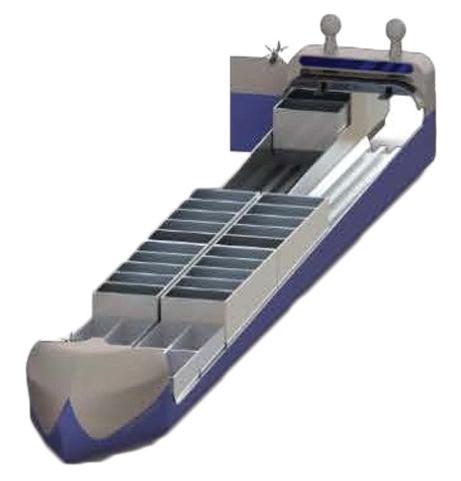
3 minute read
Future Fuels
LNG BUNKERING BARGE TO DELIVER CLEANER SHIPPING
8 Sister vessels 'FlexFueler 001' and 'FlexFueler 002' during tests in the Port
of Amsterdam A new LNG bunkering barge will start servicing the Port of Antwerp and wider region from February 2021 to support cleaner shipping.
The result of a partnership between Fluxys and Titan LNG, the Kooiman Marine-built FlexFueler 002 LNG bunkering barge will make LNG more widely available as an alternative shipping fuel from its base at the port. The bunkering barge will operated by Titan LNG, from Quay 526/528 where Fluxys facilitates truck-to-ship bunkering and Titan LNG operates a permanent bunkering point for inland waterway vessels.
Ronald van Selm, CTO of Titan LNG, commented: " Building on the very fruitful cooperation during the development and building process, we are confident that together with Fluxys, LNG bunkering in Antwerp will be a daily business soon. Jointly with the Port of Antwerp, we have already delivered LNG numerous times with the FlexFueler001, so we can guarantee our customers the safety framework is in place and functioning.”
CARBON NEUTRAL CHOICES
Titan LNG is confident that it can make available liquefied biogas (from organic waste) or liquefied synthetic methane (from green hydrogen and captured CO2) to LNG-powered vessels soon after the barge starts operations in February 2021.
Pascal de Buck, CEO of Fluxys, said: "We are proud to offer with our partner, Titan LNG, a key logistic link for the shipping industry to switch to cleaner operations in the Antwerp port and region. The prospect of introducing with our newly built bunkering barge fully carbon neutral options in the foreseeable future strengthens us in our commitment to press ahead with the energy transition."
Construction of a new railway line and ethanol storage tanks at the Port of Amsterdam will help make operations more sustainable.
Storage and logistics provider GPS Group, whose subsidiary GPS Amsterdam operates a storage and blending facility for gasoline and biofuels at the Port of Amsterdam, will develop a rail handing system as well as dedicated ethanol storage for downstream energy company VARO Energy. VARO also operates a facility at the port for blending and storing oil products.
Eric Arnold, CEO at GPS, said: “This is an important investment that will open up a whole range of new possibilities to support both our client's and our own further expansion plans, especially in the important focus area of ESG, where we aim to continue to identify more environmentally friendly logistics alternatives for our clients and sustainable business cases in growth segments such as biofuels and gases.”
The new railway line and ethanol storage tanks are set to connect to 17 Class 1 tanks in the port, the world's largest trading and blending hub for gasoline and its components.
The eco-friendly rail project will see the storage and blending facilities of GPS connect with the main railway system of The
AMSTERDAM LOOKS TO ETHANOL

8 GPS Group will develop a rail handing system and ethanol storage for VARO
Energy at the Port of Amsterdam
Netherlands and Europe. It will provide greater flexibility to the supply chain of VARO and an important transport alternative to respond to variations of the Rhine's water levels..
SOUTHAMPTON HAS HYDROGEN POTENTIAL
A hydrogen super hub could be built at the UK's ABP Port of Southampton to support and facilitate the decarbonisation of local industry and transport.
The Port of Southampton's potential as a hydrogen superhub is being explored as part of a new project UK gas company SGN is working on in partnership with Macquarie's Green Investment Group (GIG).
SGN said “Our Southampton Water project will scope the site's suitability as a centre of excellence for hydrogen production and distribution, carbon capture, utilisation and storage (CCUS), and other green technologies.”
The project's ultimate aim is to support and facilitate the decarbonisation of local industry and transport, laying the groundwork for the full decarbonisation of SGN in the south of England. Engineering firm WSP have been commissioned to undertake the project.
Around 2.6m tonnes of CO2 are emitted in and around Southampton each year from industry and customers connected to the SGN domestic heating network. A scheme incorporating CCUS technology could reduce these emissions significantly, while local hydrogen production could further cut emissions.










